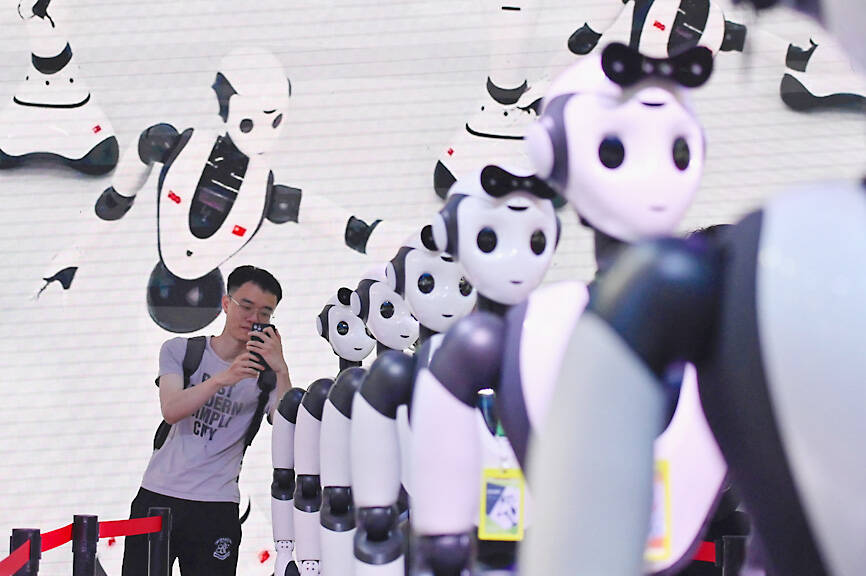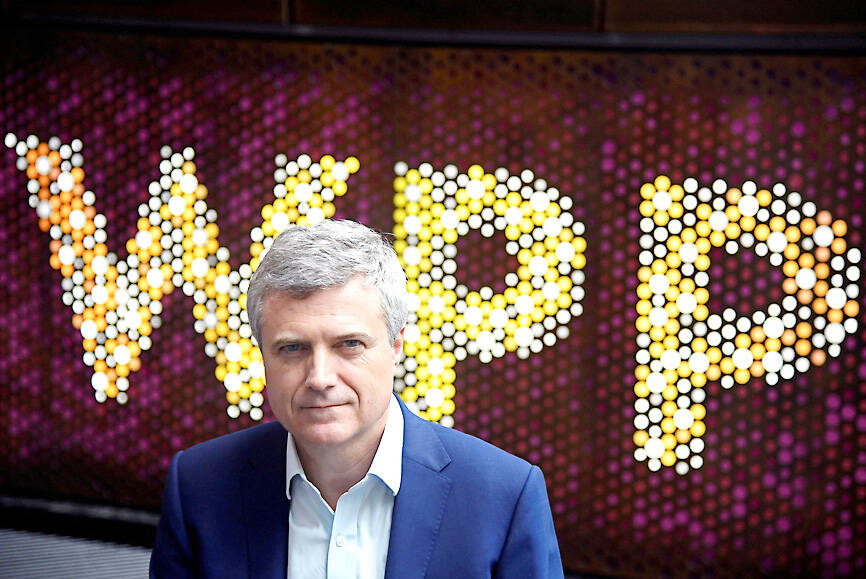Some of the world’s biggest advertisers, from food giant Nestle SA to consumer goods multinational Unilever Corp, are experimenting with using generative artificial intelligence (AI) software such as ChatGPT and DALL-E to cut costs and increase productivity, executives say.
However, many companies remain wary of security and copyright risks as well as the dangers of unintended biases baked into the raw information feeding the software, meaning humans would remain part of the process for the foreseeable future.
Generative AI, which can be used to produce content based on past data, has become a buzzword over the past year, capturing the public’s imagination and sparking interest across many industries.

Photo: AFP
Marketing teams hope it will result in cheaper, faster and virtually limitless ways to advertise products.
Investment is already ramping up amid expectations AI could forever alter the way advertisers bring products to market, executives at two top consumer goods companies and the world’s biggest ad agency said.
The technology can be used to create seemingly original text, images and even computer code, based on training, instead of simply categorizing or identifying data like other AI.

Photo: Reuters
WPP PLC, the world’s biggest advertising agency, is working with consumer goods companies including Nestle and Oreo-maker Mondelez International Inc to use generative AI in advertising campaigns, CEO Mark Read said.
“The savings can be 10 or 20 times,” Read said in an interview. “Rather than flying a film crew down to Africa to shoot a commercial, we’ve created that virtually.”
In India, WPP worked with Mondelez on an AI-driven Cadbury campaign with Bollywood superstar Shah Rukh Khan, producing ads that “featured” the actor asking passers-by to shop at 2,000 local stores during Diwali.
Small businesses used a microsite to generate versions of the ads featuring their own store that could be posted on social media and other platforms.
About 130,000 ads were created featuring 2,000 stores, which gained 94 million views across YouTube and Facebook, WPP said.
The ad agency has “20 young people in their early twenties who are AI apprentices” in London, Read said, adding that it has partnered with the University of Oxford on courses focused on the future of marketing.
The “AI for business” diploma offers training in data and AI for client leaders, practitioners and WPP executives, the company’s Web site shows.
The team work under AI expert Daniel Hulme who was appointed chief AI officer at WPP two years ago.
“It’s much easier to think about all the jobs that will be disrupted than all the jobs that will be created,” Read said.
Nestle is also working on ways to use ChatGPT 4.0 and Dall-E 2 to help market its products, Aude Gandon, WPP’s global chief marketing officer and an ex-Google executive, said in an e-mail.
“The engine is answering campaign briefs with great ideas and inspiration that are fully on brand and on strategy,” Gandon said. “The ideas are then further developed by the creative team to ultimately become content that will be produced, for example for our Web sites.”
While lawmakers and philosophers alike still debate whether content produced by generative AI models amounts to anything like human creativity, advertisers have already begun using the technology in their promotional campaigns.
In one instance, Dutch gallery the Rijksmuseum’s research team went viral online on Sept. 8 last year after using X-ray to reveal objects hidden in Baroque artist Johannes Vermeer’s oil painting The Milkmaid.
Less than 24 hours later, WPP used OpenAI’s generator system DALL-E 2 to “reveal” its own imagined scenes beyond the borders of the painting’s frame in a public YouTube ad for Nestle’s La Laitiere — or milkmaid — yogurt and dairy brand.
Through almost 1,000 iterations, the video of Nestle’s version of The Milkmaid generated 700,000 euros (US$760,869) of “media value” for the Swiss food giant. Media value is the cost of advertising needed to generate the same public exposure.
WPP said the content cost it nothing to make. A spokesperson for the Rijksmuseum said it had an open data policy for non-copyrighted images, meaning anyone can use its images.
Nestle is not alone in its experiments. Unilever, which owns more than 400 brands including Dove soap and Ben & Jerry’s ice cream, has its own generative AI technology that can write product descriptions for retailers’ Web sites and digital commerce sites, it said.
The company’s TRESemme haircare brand has used its AI content generator for written content and its automation tool for visual content on Amazon.co.uk.
However, Unilever is concerned about copyrights, intellectual property, privacy and data, global vice president of go to market technology Aaron Rajan said.
The company wants to prevent its technology from reproducing human biases, such as racial or gender stereotypes, that might be embedded in the data it processes.
“Ensuring that these models when you type in certain terms are coming back with an unstereotyped view of the world is really critical,” he said.
Gandon said that Nestle was “keeping security and privacy top-of-mind.”
Consumer companies are using data from retailers such as Walmart Inc, Carrefour and Kroger to power their AI tools, said Martin Sorrell, executive chair of advertising group S4 Capital and founder of WPP.
“You’ve got two buckets of clients: one that is jumping in fully and the other that is saying ‘let’s experiment,’” he said.
Some consumer goods firms remain wary of security risks or copyright breaches, industry executives say.
“If you want a rule of thumb: Consider everything you tell an AI service as if it were a really juicy piece of gossip. Would you want it getting out?” said Ben King, vice president of customer trust at Okta Inc, a provider of online authentication services.
“Would you want someone else knowing the same sort of thing about you?” he added. “If not, don’t tell the AI.”

South Korea’s equity benchmark yesterday crossed a new milestone just a month after surpassing the once-unthinkable 5,000 mark as surging global memory demand powers the country’s biggest chipmakers. The KOSPI advanced as much as 2.6 percent to a record 6,123, with Samsung Electronics Co and SK Hynix Inc each gaining more than 2 percent. With the benchmark now up 45 percent this year, South Korea’s stock market capitalization has also moved past France’s, following last month’s overtaking of Germany’s. Long overlooked by foreign funds, despite being undervalued, South Korean stocks have now emerged as clear winners in the global market. The so-called “artificial intelligence

NEW IDENTITY: Known for its software, India has expanded into hardware, with its semiconductor industry growing from US$38bn in 2023 to US$45bn to US$50bn India on Saturday inaugurated its first semiconductor assembly and test facility, a milestone in the government’s push to reduce dependence on foreign chipmakers and stake a claim in a sector dominated by China. Indian Prime Minister Narendra Modi opened US firm Micron Technology Inc’s semiconductor assembly, test and packaging unit in his home state of Gujarat, hailing the “dawn of a new era” for India’s technology ambitions. “When young Indians look back in the future, they will see this decade as the turning point in our tech future,” Modi told the event, which was broadcast on his YouTube channel. The plant would convert

‘SEISMIC SHIFT’: The researcher forecast there would be about 1.1 billion mobile shipments this year, down from 1.26 billion the prior year and erasing years of gains The global smartphone market is expected to contract 12.9 percent this year due to the unprecedented memorychip shortage, marking “a crisis like no other,” researcher International Data Corp (IDC) said. The new forecast, a dramatic revision down from earlier estimates, gives the latest accounting of the ongoing memory crunch that is affecting every corner of the electronics industry. The demand for advanced memory to power artificial intelligence (AI) tasks has drained global supply until well into next year and jeopardizes the business model of many smartphone makers. IDC forecast about 1.1 billion mobile shipments this year, down from 1.26 billion the prior

People stand in a Pokemon store in Tokyo on Thursday. One of the world highest-grossing franchises is celebrated its 30th anniversary yesterday.